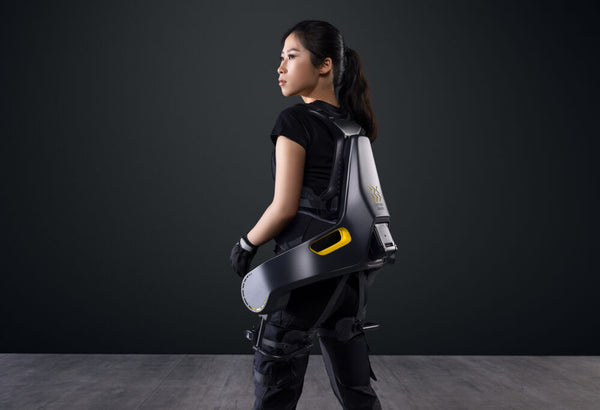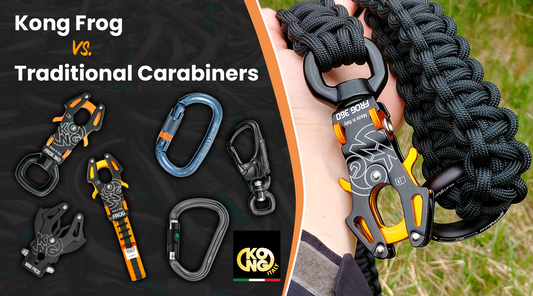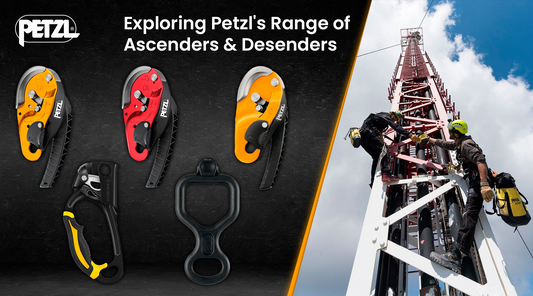What Industries Can Utilize An Exoskeleton?
In a world driven by technological innovations, the German Bionic Apogee Exoskeleton, which is now available at MTN SHOP, stands as a remarkable testament to our quest to overcome human limitations with the aim of increasing our strength and stamina. These technological exoskeletons are inspired by the concept of exoskeletons found in nature (such as insects' external skeletons) and are developed to provide various benefits for human users!
In this blog post, we will explore how this cutting-edge exoskeleton suit for lifting is revolutionizing various industries.
What is an Exoskeleton?
An Exoskeleton is a wearable device that allows the user to enhance their physical capabilities in terms of their strength, endurance, and mobility. This is beneficial in industries where it is necessary to perform physically demanding tasks such as manufacturing, logistics, construction or even healthcare.
What benefits does an Exoskeleton offer?
Enhanced Strength: The German Bionic Apogee Exoskeleton suit for lifting offers enhanced strength for the user. It allows them to bend for longer periods of time and pull, lift and lower heavy objects much easier without the added strain on their back. It also has benefits in the healthcare industry with assisting in the care of patients. The German Bionic Apogee provides support of up to 66lbs of lifting compensation!
Customizable Fit: The Apogee can be adjusted to fit the individual wearer’s body comfortably, ensuring optimal support and movement with leg straps and vest sizes ranging from XS – XL.
Real Time Data: The Apogee provides real time feedback to users and the organization to identify risks and optimize workplace safety.
Improved Endurance: The German Bionic Apogee can enhance the wearer's stamina, allowing them to work for longer periods without becoming exhausted.
Reduced Fatigue: These devices can help reduce muscular fatigue by providing support to muscles and joints. This is particularly valuable in industries involving manual labor and repetitive tasks.
The German Bionic Apogee Exoskeleton provides support for tasks that involve:

Exoskeleton's have a place in many industries, lets take a look at its application use across 6 different industries:
Exoskeletons in Construction
Health and safety in the construction industry utilizes a variety of personal protective equipment (PPE) and procedures to mitigate risk on site. With the addition of wearable technologies, more and more teams are implementing exoskeleton tools to add additional measures to protect against musculoskeletal lower back pain and injury.
Exoskeletons for Loading & Unloading: Transporting tools and materials between trucks and job sites is a common duty for construction workers. However, it's not always possible to rely on machinery for assistance. Wearable Exoskeletons offer a versatile solution for workers engaged in these tasks. With support of up to 66lbs, the German Bionic Apogee can enhance construction workers' safety and increase productivity on-site.
Exoskeletons for Lifting: Construction workers perform frequent, heavy lifting tasks throughout their day which puts them at a higher risk of injuring their backs. Exoskeleton lifting tools can add an extra layer of protection and assistance in ensuring safety during these activities.
Exoskeletons for Assembly & Installation Tasks: A powered exo suit can assist in lifting heavy materials such as granite or during scaffolding activities that require bending over to lay tiles or bricks.
"...it contributes to keeping our workers fit and healthy, which is already reflected in a decline of sick leave" - Mustafa Durmaz, Managing Director at HENZ Construction.
The German Bionic Apogee Exoskeleton in-use during construction activities.
Exoskeletons in Healthcare
The physical toll put on nurses and care workers is a significant pain point of the job. By implementing the German Bionic Apogee to add support and safety to their daily tasks, these critical workers can prevent burn out or injury and end a shift revitalized and ready to take on another day.
Exoskeletons for Elderly Care: For patients who cannot stand or lift themselves on their own, care workers often utilize their own strength to assist with this task. An Exoskeleton can help those working in geriatric facilities lift and move objects or patients more comfortably and efficiently.
Exoskeletons for Hospitals: In a fast-paced environment such as a hospital, nurses may feel pressure to use their own strength when caring for patients. With so many common tasks requiring the movement or lifting of patients, an exo suit can be a supportive measure for hospital staff to prevent injury.
Exoskeletons for Rehabilitation Staff: In rehabilitation clinics, the lifting and support of patients is a frequent requirement. By employing an Exoskeleton, therapists can engage with patients more intimately.
The German Bionic Apogee Exoskeleton in-use helping with patient care.
Exoskeletons in Logistics
Exoskeletons for Procurement: When it comes to the procurement of raw materials, parts or any other incoming shipments in logistics, a smooth flow of goods is necessary. Whether it be a small parcel that requires sorting or a large parcel where additional lifting and back support is necessary, there are a variety of areas within the process where an Exoskeleton tool can be implemented.
Exoskeletons for Material Management: Handling of materials throughout the factory or warehouse often requires movement of heavy loads off conveyor belts, onto or off pallets or even lifting up on shelves. The German Bionic Apogee is an effective solution, offering up to 66lbs of added support!
Exoskeletons for Shipping & Receiving: Managing incoming and outgoing shipments often requires loading and unloading of goods on pallets, a task hard to automate given the variety of sizes and weights. Workers can feel confident in performing their tasks without the risk of injury and organizations can benefit from a reduction in sick days and injury absences that can be detrimental to their performance.
The German Bionic Apogee Exoskeleton in-use in lifting objects.
Exoskeletons in Manufacturing
By implementing safety tools such as an Exoskeleton, organizations can show tangible proof of their commitment to employee wellbeing, while seeing reductions in sick days and increases in productivity!
Exoskeletons for Processing: Processing raw materials can put a strain on workers bodies during activities such as food production when moving heavy bags of grain or frozen meats. To assist in workplace injury prevention, wearable technologies such as exoskeletons can reduce physical exertion and support the lower back - the area most common for work-related musculoskeletal injury.
Exoskeletons for Assembly: Assembling parts requires employees to be physically involved in the process, (e.g. in automotive tire assembly). The use of an exoskeleton tool can provide support for up to 66lbs for each lift.
Exoskeletons for Production: For tasks that require leaning over for long periods of time, workers can benefit from a wearable tool that provides posture support. The added resistance of the German Bionic Apogee holds the body upright and puts less strain on the lower back.
The German Bionic Apogee Exoskeleton in-use in manufacturing.
Exoskeletons in Transportation & Baggage Handling
Whether it's by air, rail, water or truck, the transportation industry is essential to our livelihoods, but often requires a significant amount of movement and handling of goods that can put a strain on manual workers. Exoskeleton tools for transportation and baggage handling can add relief to a variety of tasks to add additional support while maintaining (or exceeding) efficiency levels.
Exoskeletons for Airport Baggage Handling: Baggage handlers take on the strenuous task of hauling and stacking hundreds of bags per hour each day. With the addition of an exoskeleton tool, an additional 66lbs of weight compensation per lift can be added to reduce the strain on workers backs, reduce wait times and help meet regulatory requirements.
Exoskeletons for Loading / Unloading Goods: Pulling or pushing pallets or individually carrying loads on and off of trucks or cargo can be a strenuous task when frequently performed. Providing lift assist support and fatigue reduction, the Apogee is the perfect support tool for this job!
Exoskeletons for Parcel Handling: When restrictions are in place that limit the weight workers can lift when handling parcels, it opens gaps in workflows where existing tools cannot fit or be deployed. The addition of a wearable tool can compliment automated processes and keep employees in the workflow at a safer and sustainable level.

The German Bionic Apogee in-use in an airport during baggage handling.
Exoskeletons in Warehousing & Fulfillment
The pressure on response time in order processing is a common concern for businesses today. In order to compete with demands at a healthy level, warehouses and fulfillment centers are looking for technology to help increase efficiency and maintain a healthy environment for workers
Exoskeletons for Palletization: To maintain consistency and quality management in the process of palletization, organizations opt to keep workers in these tasks. With the additional implementation of a powered exo suit, workers can handle bulky, heavy loads for palletizing without risking injury to their backs.
Exoskeletons for Order Picking & Commissioning: Preparing and dispatching orders is an area often looked at for automatization. However, for workflows with unique needs, an exoskeleton can be implemented to provide a "hybrid" solution where workers can utilize new technologies to remain in the function at an optimized and safe level.
The German Bionic Apogee Exoskeleton in-use in warehousing.
Visit MTN SHOP to request a quote for the German Bionic Apogee Exoskeleton today!








